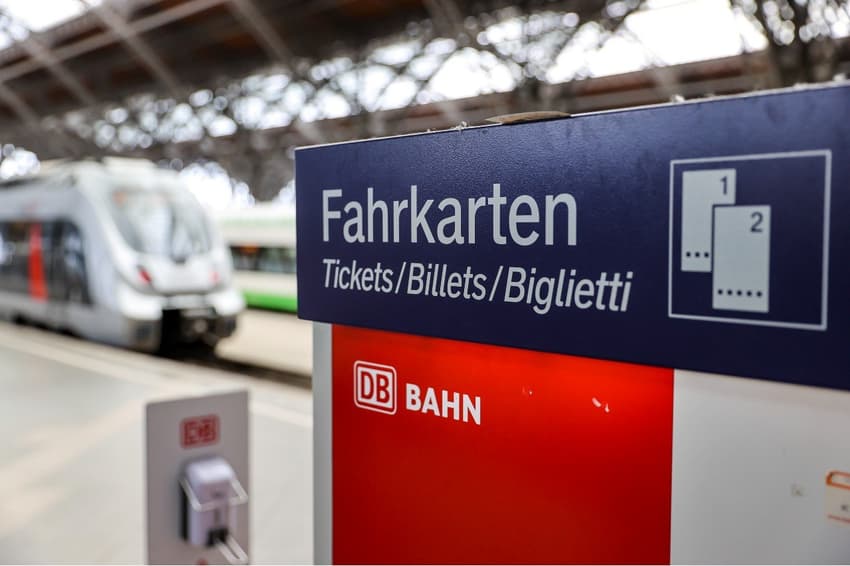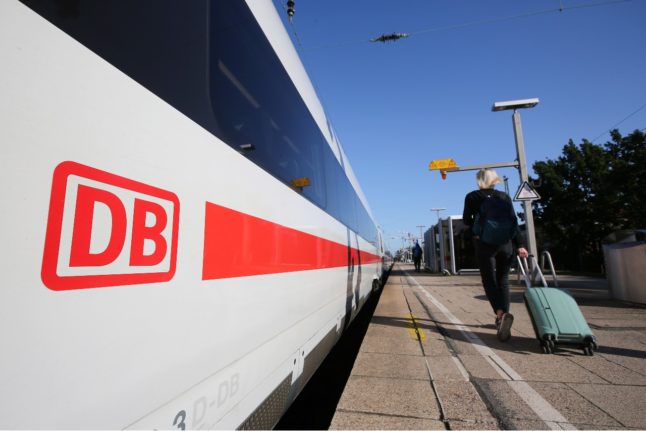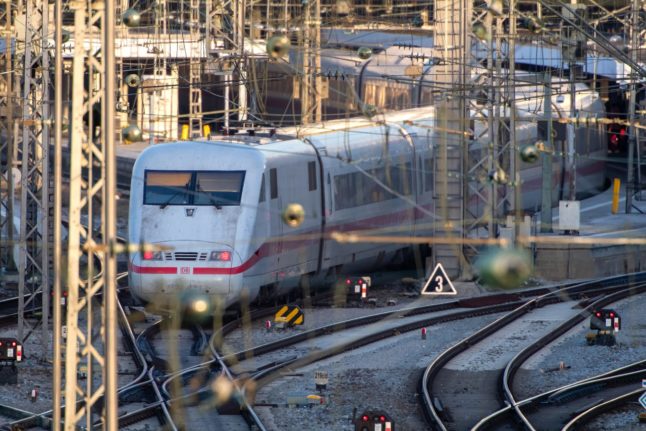Price hikes and new deals: How much will train travel in Germany cost next year?

People in Germany will have to dig deeper in their pockets to travel with Deutsche Bahn in the near future - but there are still some deals to be had.
What's going on?
It's no secret that life has been getting more expensive lately, and Germany's state-owned rail operator has now become the latest in a serious of companies to announce a rise in prices.
The company's Flex tickets - which allow passengers more flexibility in their journey - will go up in price by 4.9 percent later this year.
With a Flex ticket, rail customers can take any long-distance train on the day of travel and also have more cancellation rights. That's in contrast to the Saver and SuperSaver tickets, which restrict passengers to a certain service at a certain time of day.
In an email to customers announcing the move, DB explained that it had been hit by high inflation.
"Like many other companies, Deutsche Bahn is also affected by general price increases, for example in the energy sector," the company wrote. "Unfortunately, however, we cannot fully absorb these."
The prices of the company's Bahncard 25 will also rise this year. Instead of €59.90 for a full year, the railcard will cost €62.90. For a three-month railcard, the price will go up from €36.90 to €39.90. For Seniors and other concessions, an annual Bahncard 25 will now cost €40.80 instead of €38.80.
The Bahncard 25 gives holders a 25 percent discount on rail tickets, including Saver and SuperSaver tickets.

An ICE train at Hamburg Altona station. Photo: picture alliance/dpa | Bodo Marks
When will the new prices come into effect?
The new prices will apply from December 10th, when a different timetable will also come into effect. That means that, up to and including December 9th, all journeys can still be booked at the old prices - even if you're booking for a journey on the new timetable.
In other words, if you're planning a train journey around Christmas, it might be worth booking now before the prices start shooting up.
Highlights of the new timetable include night services between Berlin, Brussels and Paris, more frequent high-speed services between Berlin and Munich and Berlin and North Rhine-Westphalia, and new services in the east of the country between Leipzig, Nuremberg and Jena.
READ ALSO: KEY POINTS: How Germany's long-distance train services will change next year
Another change when the new timetable comes in will be the discontinuation of dining cars in intercity (but not ICE) trains, which DB announced on Tuesday. Instead, snack trolleys will be available on long-distance services.
Are there still cheap deals to be had?
There certainly are. DB's popular Saver and SuperSaver tickets - which account for 80 percent of the tickets sold by Deutsche Bahn - are set to remain the same price for the foreseeable future.
That means that people who book long enough in advance - or pick the right train services - can travel one-way for just €17.90, or as little as €13.40 with a Bahncard 25 or 50. For Saver tickets, the price will remain set at €21.90 or around €16.40 with a Bahncard.

An ICE long-distance train leaves Munich Hauptbahnhof. Photo: picture alliance/dpa | Peter Kneffel
According to Deutsche Bahn, new deals for seniors will also come on the market soon, enabling people over the age to 65 to snatch an extra €2 off on both the Saver and the SuperSaver tickets.
One other significant change is that the Cityticket - an add-on that allows you to travel on local transport at your destination - will now only be available with Flex tickets. Previously you could pick up a Saver ticket along with a Cityticket for a bargain price.
READ ALSO: EXPLAINED: What you need to know about Germany's new long-distance rail timetable
In addition, the state-owned rail company is bringing back its short-distance tickets, which allow passengers to enjoy the comfort of an ICE train for less than ten euros, for a limited period of time.
Until March 31st, 2024, a number of one-way intercity tickets will be available to purchase for just €9.90 one way - or €7.49 with a Bahncard. Customers can book up to 180 days before their journey or shortly in advance, but it's worth being quick since there are only a set number of tickets available.
Deutsche Bahn says the on offer journeys will include popular routes such as Augsburg - Munich, Stuttgart - Ulm, Dresden - Leipzig, Cologne - Düsseldorf, Frankfurt - Mannheim and Hamburg - Bremen. In many cases, the ICE deal works out cheaper than a regional train.
DB first introduced its headline-grabbing deal back in June this year - shortly after the launch of the €49 ticket.
With the Deutschlandticket allowing unlimited travel on local and regional trains around Germany, the rail operator is attempting to lure customers back onto its pricier ICE services - largely with major discounts.
READ ALSO: Deutsche Bahn to get rid of bistros in German Intercity trains
How do I know when the cheap seats will be available?
Unfortunately, that's hard to say - but it's worth trying to book as far in advance as possible and looking at a range of times you could travel during the day, as there can often be major fluctuations in pricing.
According to Karl-Peter Naumann, the chairman of passenger association Pro Bahn, one of the reasons that pricing seems confusing for passengers is because Deutsche Bahn links its tariffs to a number of factors, including the popularity of services on the timetable.
By offering a range of prices, the railway primarily wants to control demand and better distribute the capacity utilisation, Naumann told Tagesschau. That's why full trains on Friday evenings are significantly more expensive than on Tuesday afternoons when hardly anyone is travelling.
"In the end, the passengers also benefit from this," he explained.
Comments
See Also
What's going on?
It's no secret that life has been getting more expensive lately, and Germany's state-owned rail operator has now become the latest in a serious of companies to announce a rise in prices.
The company's Flex tickets - which allow passengers more flexibility in their journey - will go up in price by 4.9 percent later this year.
With a Flex ticket, rail customers can take any long-distance train on the day of travel and also have more cancellation rights. That's in contrast to the Saver and SuperSaver tickets, which restrict passengers to a certain service at a certain time of day.
In an email to customers announcing the move, DB explained that it had been hit by high inflation.
"Like many other companies, Deutsche Bahn is also affected by general price increases, for example in the energy sector," the company wrote. "Unfortunately, however, we cannot fully absorb these."
The prices of the company's Bahncard 25 will also rise this year. Instead of €59.90 for a full year, the railcard will cost €62.90. For a three-month railcard, the price will go up from €36.90 to €39.90. For Seniors and other concessions, an annual Bahncard 25 will now cost €40.80 instead of €38.80.
The Bahncard 25 gives holders a 25 percent discount on rail tickets, including Saver and SuperSaver tickets.

When will the new prices come into effect?
The new prices will apply from December 10th, when a different timetable will also come into effect. That means that, up to and including December 9th, all journeys can still be booked at the old prices - even if you're booking for a journey on the new timetable.
In other words, if you're planning a train journey around Christmas, it might be worth booking now before the prices start shooting up.
Highlights of the new timetable include night services between Berlin, Brussels and Paris, more frequent high-speed services between Berlin and Munich and Berlin and North Rhine-Westphalia, and new services in the east of the country between Leipzig, Nuremberg and Jena.
READ ALSO: KEY POINTS: How Germany's long-distance train services will change next year
Another change when the new timetable comes in will be the discontinuation of dining cars in intercity (but not ICE) trains, which DB announced on Tuesday. Instead, snack trolleys will be available on long-distance services.
Are there still cheap deals to be had?
There certainly are. DB's popular Saver and SuperSaver tickets - which account for 80 percent of the tickets sold by Deutsche Bahn - are set to remain the same price for the foreseeable future.
That means that people who book long enough in advance - or pick the right train services - can travel one-way for just €17.90, or as little as €13.40 with a Bahncard 25 or 50. For Saver tickets, the price will remain set at €21.90 or around €16.40 with a Bahncard.

According to Deutsche Bahn, new deals for seniors will also come on the market soon, enabling people over the age to 65 to snatch an extra €2 off on both the Saver and the SuperSaver tickets.
One other significant change is that the Cityticket - an add-on that allows you to travel on local transport at your destination - will now only be available with Flex tickets. Previously you could pick up a Saver ticket along with a Cityticket for a bargain price.
READ ALSO: EXPLAINED: What you need to know about Germany's new long-distance rail timetable
In addition, the state-owned rail company is bringing back its short-distance tickets, which allow passengers to enjoy the comfort of an ICE train for less than ten euros, for a limited period of time.
Until March 31st, 2024, a number of one-way intercity tickets will be available to purchase for just €9.90 one way - or €7.49 with a Bahncard. Customers can book up to 180 days before their journey or shortly in advance, but it's worth being quick since there are only a set number of tickets available.
Deutsche Bahn says the on offer journeys will include popular routes such as Augsburg - Munich, Stuttgart - Ulm, Dresden - Leipzig, Cologne - Düsseldorf, Frankfurt - Mannheim and Hamburg - Bremen. In many cases, the ICE deal works out cheaper than a regional train.
DB first introduced its headline-grabbing deal back in June this year - shortly after the launch of the €49 ticket.
With the Deutschlandticket allowing unlimited travel on local and regional trains around Germany, the rail operator is attempting to lure customers back onto its pricier ICE services - largely with major discounts.
READ ALSO: Deutsche Bahn to get rid of bistros in German Intercity trains
How do I know when the cheap seats will be available?
Unfortunately, that's hard to say - but it's worth trying to book as far in advance as possible and looking at a range of times you could travel during the day, as there can often be major fluctuations in pricing.
According to Karl-Peter Naumann, the chairman of passenger association Pro Bahn, one of the reasons that pricing seems confusing for passengers is because Deutsche Bahn links its tariffs to a number of factors, including the popularity of services on the timetable.
By offering a range of prices, the railway primarily wants to control demand and better distribute the capacity utilisation, Naumann told Tagesschau. That's why full trains on Friday evenings are significantly more expensive than on Tuesday afternoons when hardly anyone is travelling.
"In the end, the passengers also benefit from this," he explained.
Join the conversation in our comments section below. Share your own views and experience and if you have a question or suggestion for our journalists then email us at [email protected].
Please keep comments civil, constructive and on topic – and make sure to read our terms of use before getting involved.
Please log in here to leave a comment.